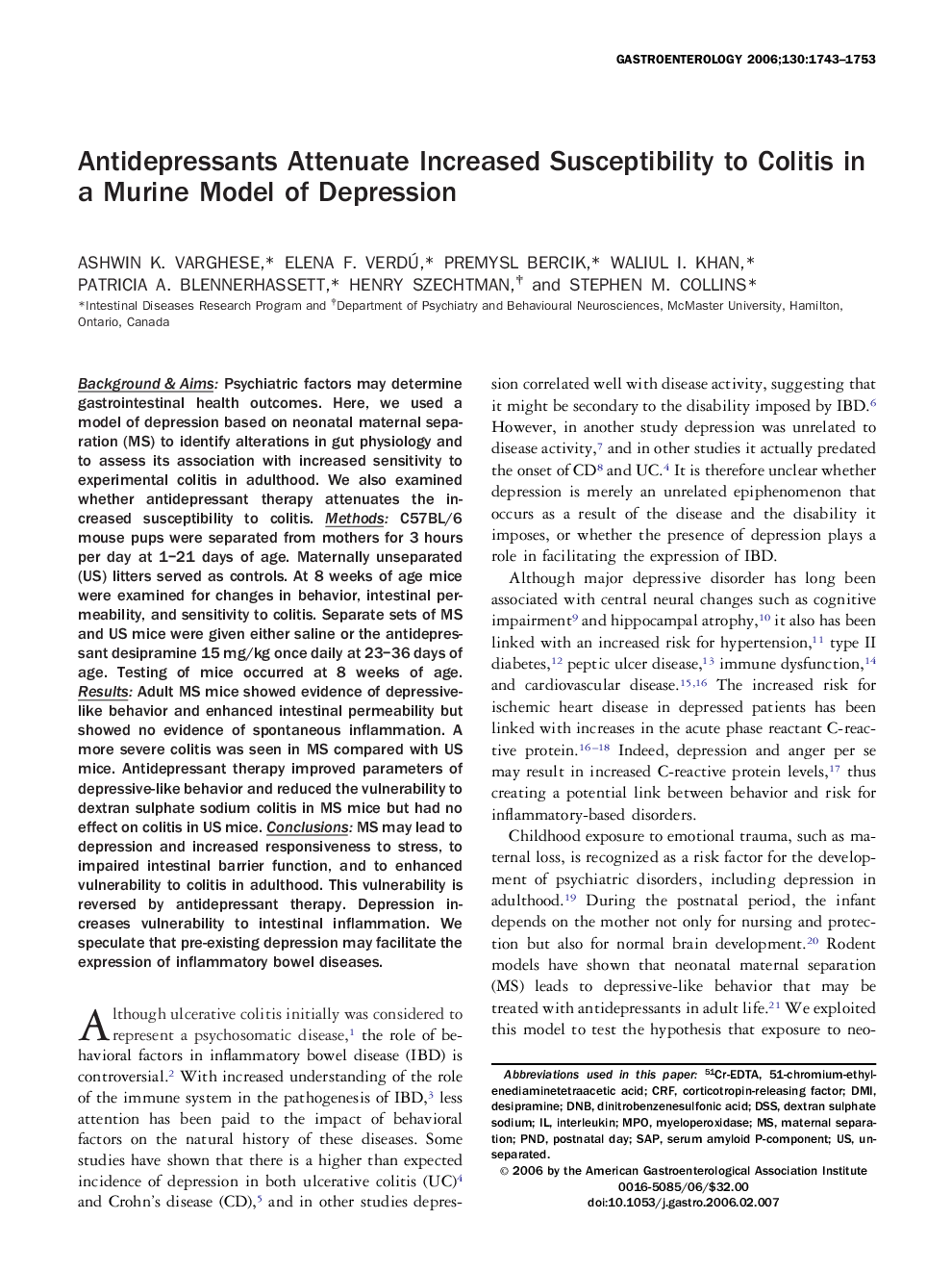| کد مقاله | کد نشریه | سال انتشار | مقاله انگلیسی | نسخه تمام متن |
|---|---|---|---|---|
| 3297630 | 1209887 | 2006 | 11 صفحه PDF | دانلود رایگان |
عنوان انگلیسی مقاله ISI
Antidepressants Attenuate Increased Susceptibility to Colitis in a Murine Model of Depression
دانلود مقاله + سفارش ترجمه
دانلود مقاله ISI انگلیسی
رایگان برای ایرانیان
کلمات کلیدی
dinitrobenzenesulfonic acidDNBDSSPNDCRFDMIdesipramineserum amyloid P-component51Cr-EDTAMPO - DFOinterleukin - اینترلوکینmaternal separation - جدایی مادرdextran sulphate sodium - دی سولفات سدیمpostnatal day - روز پس از زایمانSAP - شیرهcorticotropin-releasing factor - عامل تخریب کورتیکوتروپینmyeloperoxidase - میلوپراکسیداز
موضوعات مرتبط
علوم پزشکی و سلامت
پزشکی و دندانپزشکی
بیماریهای گوارشی
پیش نمایش صفحه اول مقاله

چکیده انگلیسی
Background & Aims: Psychiatric factors may determine gastrointestinal health outcomes. Here, we used a model of depression based on neonatal maternal separation (MS) to identify alterations in gut physiology and to assess its association with increased sensitivity to experimental colitis in adulthood. We also examined whether antidepressant therapy attenuates the increased susceptibility to colitis. Methods: C57BL/6 mouse pups were separated from mothers for 3 hours per day at 1-21 days of age. Maternally unseparated (US) litters served as controls. At 8 weeks of age mice were examined for changes in behavior, intestinal permeability, and sensitivity to colitis. Separate sets of MS and US mice were given either saline or the antidepressant desipramine 15 mg/kg once daily at 23-36 days of age. Testing of mice occurred at 8 weeks of age. Results: Adult MS mice showed evidence of depressive-like behavior and enhanced intestinal permeability but showed no evidence of spontaneous inflammation. A more severe colitis was seen in MS compared with US mice. Antidepressant therapy improved parameters of depressive-like behavior and reduced the vulnerability to dextran sulphate sodium colitis in MS mice but had no effect on colitis in US mice. Conclusions: MS may lead to depression and increased responsiveness to stress, to impaired intestinal barrier function, and to enhanced vulnerability to colitis in adulthood. This vulnerability is reversed by antidepressant therapy. Depression increases vulnerability to intestinal inflammation. We speculate that pre-existing depression may facilitate the expression of inflammatory bowel diseases.
ناشر
Database: Elsevier - ScienceDirect (ساینس دایرکت)
Journal: Gastroenterology - Volume 130, Issue 6, May 2006, Pages 1743-1753
Journal: Gastroenterology - Volume 130, Issue 6, May 2006, Pages 1743-1753
نویسندگان
Ashwin K. Varghese, Elena F. Verdú, Premysl Bercik, Waliul I. Khan, Patricia A. Blennerhassett, Henry Szechtman, Stephen M. Collins,